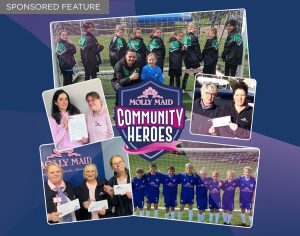For the last two years there’s been talk of a “new normal” when it comes to work. Paul Clegg discusses why he doesn’t think we’re quite there, and why this is affecting your leads.
How many times have you heard or said, “the new normal” this year? Since the pandemic started, over two years ago, there’s been much discussion around what “the new normal” will look like, for people in work. And whilst we know it involves a hybrid way of working, with some level of flexibility, the fact is, we’re still not quite “there” wherever there is!
I think this is evidenced by two key factors:
1. Some employers are still trying to understand what level of flexible working they want
to offer staff
2. Some industries within franchising, have seen a growth in their leads, but not all
Let me explain!
Employer decisions affecting employees decision-making
At the beginning of May, news broke of a London-based law firm informing staff they had to return to the office for at least three days a week, or salaries would be cut by 20%. This was preceded, a couple of weeks earlier, by the infamous “sorry I missed you” notes left by Jacob Rees-Mogg, on the desks of civil servants.
These kind of decisions, which impact the ordinary worker, may have the opposite effect than what is desired. For example, the law firm believe by encouraging people to return to the office, it will boost staff morale and collaboration. As quoted in The Times, they said: “Like so many firms, we see value in being in the office together regularly, while also being able to offer our people flexibility.” Rees-Mogg has also said he’s keen to see civil servants back in the office, following reports of office occupancy being 42% of pre-pandemic levels.
Human psychology doesn’t work like that!
However, when people feel they’re being coerced or hemmed in, they’re more likely to attempt to fly away. Which is why I’m not certain we’ve reached the “new normal” when decisions like these are still being made, and the potential impact it could have on people.
So, will more companies follow suit with decisions like these? If so, this could well be the turning point for those who are still waiting to see what happens, before making a career changing decision. I suspect with the cost of living crisis, and threats of another recession, companies may well end-up making decisions which could encourage a “great migration”, forcing staff to find work which offer better personal benefits.
The right industries attract the right attention
We know the pandemic caused many people to rethink work; to see it not as a means to an end, but as a means of expressing who they are. People started looking for job opportunities which gave them a sense of purpose. Which is why some franchises have seen the number of leads they’re attracting either increase, or remain steady, and why some currently feel frustrated and out on a limb.
As someone who is passionate about the franchise industry I know, as well as you do, any franchise in any sector can give someone the sense of pride, purpose and accomplishment, they’re looking for. It’s not always about working in one sector over another, but what franchisees can do through their own businesses: by giving back, by providing crucial employment, or by offering expert guidance to the local community.
So, how can you be ready for the “new normal”?
As a franchisor, the biggest advantage you have, is by offering your audience the ability to achieve autonomy, not just the flexibility of hybrid working. The control of how, when and where they work can be theirs – depending on your franchise opportunity. Some franchise brands, for example, advise new partners to have a professional space, for meeting clients, otherwise, working from home is fully achievable. Although as they grow, new franchisees may want to consider investment in their team, by providing somewhere to work.
For some of your target audience… the pain point is literally the next decision their employer makes, which goes against what they want. So, you can be ready to highlight a solution.
And, whilst we’re on the subject of pain points, you need to start press the bruises of your audience, in order to connect with them better. What concerns them, right now?
The cost of living?
The health of the planet?
Finding their purpose in life?
These are very much on the minds of large numbers of people, and so you should be looking at how you can address these issues within your marketing. If you’re not, the chance of you being overlooked for a brand which does, is high.
However, authenticity is key, here:
Talk about how new franchisees exceeded their first year goals, and the successes of your bigger franchisees
Show what you’re really doing to address sustainability as a business.
Show how your franchisees love what they do, as well as who they’re working with, how they’re making a difference, and how they’re able to give back.
When you do, you make it easier for your prosects to see themselves in your franchise, so they become a lead. Then you can continue to talk with them about the benefits of what it would mean if they owned one of your franchises. People are hesitant, still. So, don’t expect to turn a lead overnight. However, inspire them to take control and build a better future, preferably with your guidance and support.
If you need some help with identifying the right strategic approach to reach your audience, then let me know. We’d love to offer you further insights, and suggestions of how to create the marketing
for your brand.

































